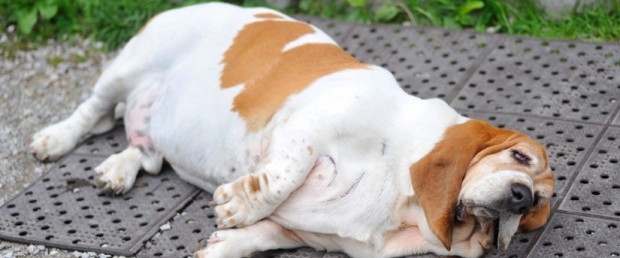(What follows is a gross oversimplification of a somewhat nuanced issue. If, by the end of this post, you remain skeptical of my conclusions, I urge you to grab a copy of my book, Dogs, Dog Food, and Dogma. It includes a much more fulsome discussion of this important topic, one complete with citations, end notes, original sources, and all that good stuff.)
When we talk about body fat and its impact on canine health, we usually use terms like “too fat,” “obese,” and “overweight.” These terms have something in common: they all suggest that there is a bright line separating the healthy from the unhealthy. If your dog falls on the bad side of the line then she’s too fat. If she doesn’t then she’s not.
We do this because this kind of yes-or-no framework has been handed down to us from the world’s leading public health authorities. When the World Health Organization talks about the dangers of excessive body fat, it uses words like “obesity” and “overweight” to define the problem. The American Veterinary Medical Association does the same thing.
But there’s a problem with this kind of thinking: it doesn’t really reflect the scientifically-verified reality about the dangers of body fat.
What the science actually shows is that we should think of body fat as being like a kind of natural poison. The more of it inside your dog’s body, the worse off she is. The less of it inside her body, the healthier she is likely to be.
So how can I make this counter-intuitive and somewhat revolutionary claim?
Well, I’ve spent the past four years practically living in the scientific record surrounding canine body condition. And I can report that the science supports the fat-is-poison paradigm much more so than the yes-or-no paradigm.
When the relationship between body fat and canine health has been examined scientifically, it has usually been through experiments comparing a group of fat dogs and a group of not-so-fat dogs. There are dozens of such studies. And they almost always show that the fat dogs tend to be worse off. They get sick much more frequently than their leaner counterparts and they die much younger.
But there’s another way to study the dangers of corpulence: examine a whole range of body conditions (very lean, somewhat lean, somewhat fat, very fat, etc.), and see which one is healthiest. Such studies are rare. But they have been done, on a few rare occasions. And they have pretty consistently shown that the leanest dogs of all tend to also be the healthiest dogs of all. They tend to develop fewer chronic diseases than all other body types. And they tend to tend to live the longest too.
There are other reasons to opt for the leaner-is-better framework: (1) similar studies in human beings have shown precisely the same thing as their canine equivalents: the leanest among us also tend to be the healthiest and longest-living; (2) scientists not only understand that leaner is better, they also understand why it is better (essentially, because body fat secretes dangerous substances, stuff we’d want as little as possible of in our bodies); and (3) what we’ve come to think of as “normal” body condition for a dog (perhaps 20% body fat), is far fatter than even the fattest wild animal.
All of this points in the same direction: if you want your dog to live as long as her genes and providence allow, you should strive to keep her as lean as possible.
Now, there is a big, big caveat to this rule: muscle and fat are not the same thing. The science suggests that your dog can’t really be “too lean,” but she certainly can be “too scrawny.” The horrible images we’ve all seen of emaciated abandoned pets most definitely do not depict ideal body conditions. These dogs have lost almost all of their musculature because they’ve been starved. Practically the last thing you should want is for your dog to wind up like that.
If you want your dog to live as long as possible, what you want is for her to have the canine equivalent of a professional athlete’s physique. Check out this Facebook group for some concrete (and adorable) examples of what I mean.
That’s all for today.




Leave a Reply